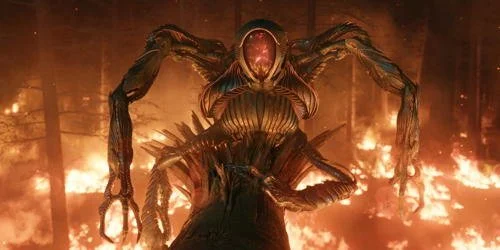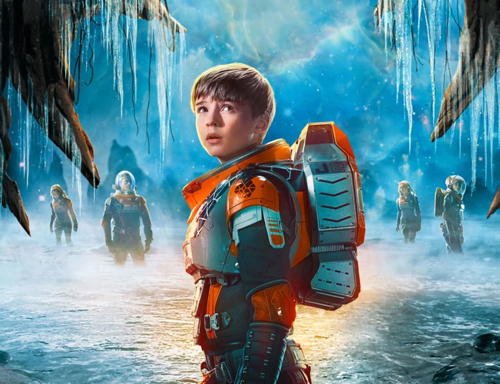Lost in Space: Oreo Icebox Cake 🥁 🥁 🥁 1/2
/Year Released: 20018-2020
Created by: Irwin Allen
Starring: Maxwell Jenkins, Molly Parker, Mina Sundall, Toby Stevens, Taylor Russell, Parker Posey, Ignacio Serricchio
Genre: Science Fiction
“Danger, Will Robinson.” –Robot
Sure, it’s cheesy, a cinematic stew of Han Solo, Indiana Jones, look alike monsters from Jurassic World, bits of Isaac Asimov’s I, Robot, sprinkles of Doogie Howser, M.D., and even MacGyver. But it also affirms Faith, Family, Forgiveness and Redemption without ever explicitly mentioning religion per se. This is Netflix, after all.
After crash landing on an alien planet, the Robinson family fights against all odds to survive and escape. But they’re surround by hidden dangers.
Not to mention its literary ancestry, certainly elevating this space soap opera as well. We go all the way back to Daniel Defoe’s Robinson Crusoe, shipwrecked on an island and befriending a prisoner aptly named Friday after the day he freed him. Will’s “Danger, Will Robinson” robot, becoming Friday modern equivalent.
And Different Drummer can never forget the next reiteration of a stranded Robinson, this time a whole family, in Disney’s 1960’s Swiss Family Robinson. Their island abode was unforgettable, and certainly more inviting than the series of sterile spaceships our recent Lost in Space crowd inhabits.
The early television series Lost in Space (1965-1968), also produced by Irwin Allen, is science fiction light, probably why Different Drummer was never a big fan, her only memory the pivotal line, “Danger, Will Robinson.” Star Trek was much more cerebral and challenging, but the two 60s series both shared something of an anomaly in science fiction.
They were not dystopian doomsday scenarios but rather hopeful about the future. Maybe we need more of that in our current cinema, even with the world seemingly imploding before our eyes.
Irwin Allen’s more recent Lost in Space Netflix series seems to have more intellectual heft than its predecessor, too. Without specifically alluding to Isaac Asimov’s I Robot, a great book not to be confused with the vapid film of the same name, it plays with the scientist /writer’s Three Laws of Robotics
A robot may not injure a human being or, through inaction, allow a human being to come to harm.
A robot must obey orders given it by human beings except where such orders would conflict with the First Law.
A robot must protect its own existence as long as such protection does not conflict with the First or Second Law.
No matter how thought out or well-meaning, they all can go wrong. These “laws” sound airtight, which should ring alarm bells for all of us now grappling with AI’s (artificial intelligence) swift takeover of just about everything. Another scientist, Stephen Hawking, warned us about this:
"The development of full artificial intelligence could spell the end of the human race."
Faith
More hope than faith in the religious context, as Different Drummer noted earlier. This is, after all, Netflix. All of humanity hopes to survive the coming cataclysm on earth, already polluted. The Robinsons especially face major disasters that should cause them to give up. Little things like crashing onto a freezing planet as nightfall approaches, their daughter trapped under the ice there, a band of killer robots bent of their destruction, a devious stowaway sabotaging them at every turn, as well as lack of food, fuel, and just about everything else at one time or another.
But as Maureen Robinson (Molly Parker) keeps saying, “For every problem there is a solution.
In a continuing girl power turn in the series, she is now the scientist, while her husband John (Toby Stephens) is more a man of action, a Navy Seal. This emphasis on female heroes is a little heavy handed at times but expected in our increasingly cinematic overcorrection for past “sins” now preeminent in filmdom.
Family
The girl power overcorrection is mild, however, and certainly remedied with an emphasis of family and how that love sustains them throughout. Judy (Taylor Russel) an 18-year-old medical intern (Doogie Howser, M.D. reference for those of us of a certain age) takes every risk to help others, not only the icy descent that almost killed her, but pushing for hard decisions when oxygen is low. Penny (Mina Sundwell) rips off her superficial inferiority complex to pilot both land and space vehicles when she has no idea what she is doing, learning on the job as she careens near cliffs and snowbanks. Because the family has to be rescued by someone.
And young Will Robinson (Maxwell Jenkins), goes from a frightened child whose hesitation almost kills his sister, to the one with secret plans and heroic encounters with killer robots in his dangerous attempt to save both humanity and the robots themselves.
Forgiveness and Redemption
Throughout the series the humans are – well – human. They make mistakes. Some commanders give up too easily; they are not the never-give-up Robinsons, after all. They are willing to sacrifice many lives if they see no way out. Or they are cynical and care only about themselves, as does our Han Solo swashbuckler, Don West the smuggler (Ignacio Serricchio). He is more concerned with keeping his black-market stash of Bourbon, bold but not really brave – until he starts spending too much time with the Robinsons. Their courage is infectious, and he ultimately succumbs to that disease, even when it imperils his freedom and his life.
Finally, a scene that is either exquisite or blasphemous recalls of Michelangelo’s painting from the Sistine Chapel, The Creation of Adam. A sci fi version, at least.
An evil robot touches Will, Mayan like, to grasp his heart, but instead awakens the good robot hiding inside that heart, An electric blue cascades from Will’s heart to the bad robot, breathing life and potential goodness into that creature just as God did in Michelangelo’s painting.
In these hard times, even if we are not in space, many of us feel lost. This series reminds us of the courage, love, and forgiveness buried deep inside every living creature. We have family in our fellows, even if the ties are not biological.
Lost in Space, cheesy on the outside, but soulful on the inside, reminds us of that. Give it a try.
–Kathy Borich
🥁 🥁 🥁 1/2
Trailer
Film-Loving Foodie
Penny, the middle Robinson child, is crazy for Oreos. She is content to eat them right out of the box, but let’s make something a little more spectacular, ok?
Our Oreo Icebox Cake is perfect. Simple, only 4 ingredients. And being frozen, it recalls the first crash landing that almost ended everything for the whole Robinson family, too.
A nice recipe for the kids or grandkids.
Enjoy every decadent bite.
Oreo Icebox Cake
“Oreo icebox cake is an easy no-bake dessert that requires only 4 ingredients to make. This creamy Oreo cake is perfect for any occasion. “ Diana
Ingredients
· ▢ 2 cups (475ml) heavy whipping cream
· ▢ 2 tablespoons powdered sugar
· ▢ 1 teaspoon pure vanilla extract
· ▢ 32 Oreo cookies whole
· ▢ 3 Oreo cookies crushed
Instructions
· To a bowl of a stand mixer, add heavy cream, powdered sugar, and vanilla extract. Beat until whipped and creamy (be careful not to overwhip).
· In an 8-inch square pan, layer Oreo cookies in one layer. Top with half of the whipped cream, and smooth out with a spatula. Repeat with one more layer.
· Top with crushed Oreos, cover with plastic wrap, and chill in the fridge for at least 4 hours and preferably overnight.
· For clean slices, freeze for 30 minutes before serving. Slice and serve.
Notes
· You can make this recipe with any flavor of Oreos you want!
· To Store/To Make Ahead: Icebox cake can be kept covered in the fridge for up to 3 days before serving.
· Using gluten-free Oreos can make this a gluten-free icebox cake.


















